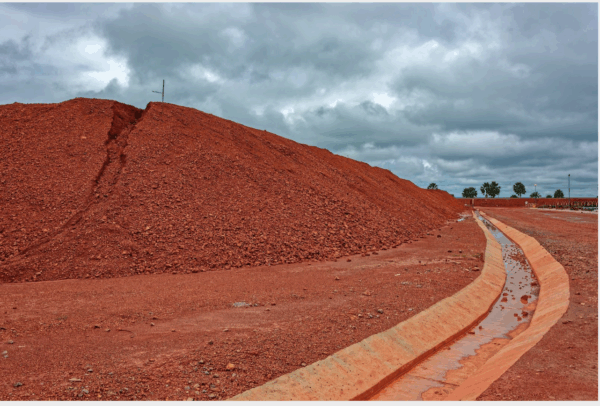In May 2025, more than a hundred mining licenses were revoked within a few days, with little explanation, following an announcement broadcast on national television. The transparency claimed by the government is accompanied by a certain degree of opacity when it comes to natural resources, which are the country’s wealth and, above all, its only current development engine.
Several international companies had their licenses revoked, including the Guinean subsidiary of AngloGold Ashanti and Predictive Discovery, both active in the gold sector. Arrow Minerals (bauxite) and Falcon Energy Materials (graphite) also had their licenses revoked. Dozens of license holders feel aggrieved by this decision of the junta.
This is the case, for example, of Axis Minerals, which invested in Guinea in 2013 in the bauxite sector, at a time when few still believed in the country’s potential. The company stands out, as its project has been in production for several years, while most of the revoked licenses concern exploration permits or projects under development. Thanks to its efforts and long-term commitment, the company has established a prosperous mine, allowing the export of nearly 40 million tons of bauxite with its partners between 2023 and May 2025. Its mining license has thus become the country’s second source of bauxite, transforming the once isolated village of Boffa into a dynamic mining center employing over 5,000 people. The company’s activities were interrupted on May 15 by the police, following the announcement of the revocation broadcast on national television. To date, it has not received any official notification from the authorities, despite multiple attempts at dialogue. Axis Minerals was founded by Australian-Swiss businessman Pankaj Oswal, heading a global conglomerate worth billions of dollars, present in Africa, Asia, and Europe.
This success deserves to be applauded, as when an operator embarks on exploration activities, there is no guarantee of results at the start. This example should have been proof to the Guinean authorities that foreign investments can generate significant benefits for local and national economies. Today, this same company has had its license revoked, without reason or explanation. Could a worse signal be sent to the international investor community?
A purge resembling organized predation
The official discourse is one of a desire to improve governance in the mining sector. But in practice, a real purge is taking place. In the mining sector, the revocation decisions have been interpreted as more political than technical. Instead of reassuring investors, they have increased uncertainty about the governance of natural resources in Guinea. The Ministry of Mines and Geology has become a black box, where it is difficult to understand the development policy for the sector, probably undermined by interested advisors and business-minded officials.
The promise of reform in the mining sector made by the government since May 2025 seems to be giving way to a logic of rent and short-term gain. Several actors are already talking about the emergence of a new mining kleptocracy, disguised as a facade recovery.
Was President Doumbouya deceived?
What makes the Axis case even more troubling is what it can reveal about systemic dysfunctions at the heart of the junta administration.
More and more voices are expressing concern that President Mamadi Doumbouya himself may not have been fully informed about the elements surrounding the Axis Minerals file before the revocation of its license. On paper, Axis appeared as an exemplary operator: compliant with tax regulations, legally structured, operational, and recognized — according to sources close to the company — for its proven contribution to Guinea’s economic growth. It had no disputes with the state, no regulatory shortcomings, and had reinvested massively in the country at a time when investor confidence was at its lowest.
Guinea’s reputation at stake
The situation in Guinea is part of a broader trend of challenging the balance between states and investors in Africa, but the Guinean method stands out for its brutality and lack of dialogue. For serious mining groups, Guinea is becoming a high-risk area, despite its huge potential in bauxite, iron, gold, and lithium.
According to the annual report of the Fraser Institute, published in July 2025, the country is now among the ten least attractive jurisdictions globally for mining investments. The massive withdrawal of over 300 mining rights since May 2025, without respecting the law, certainly confirms this ranking.
International investors like Axis Minerals do not seem ready to give up. For example, the company has reportedly engaged the international law firm Jones Day and has already initiated legal proceedings based on investment treaties between the United Arab Emirates and Guinea. The claimed compensations amount to several billion dollars. Given the number of disputes that could be brought against Guinea, the country could face astronomical financial obligations. With such a government in charge, Guinea risks losing even more attractiveness to investors. Once again, it is the Guineans who are likely to bear the brunt.


